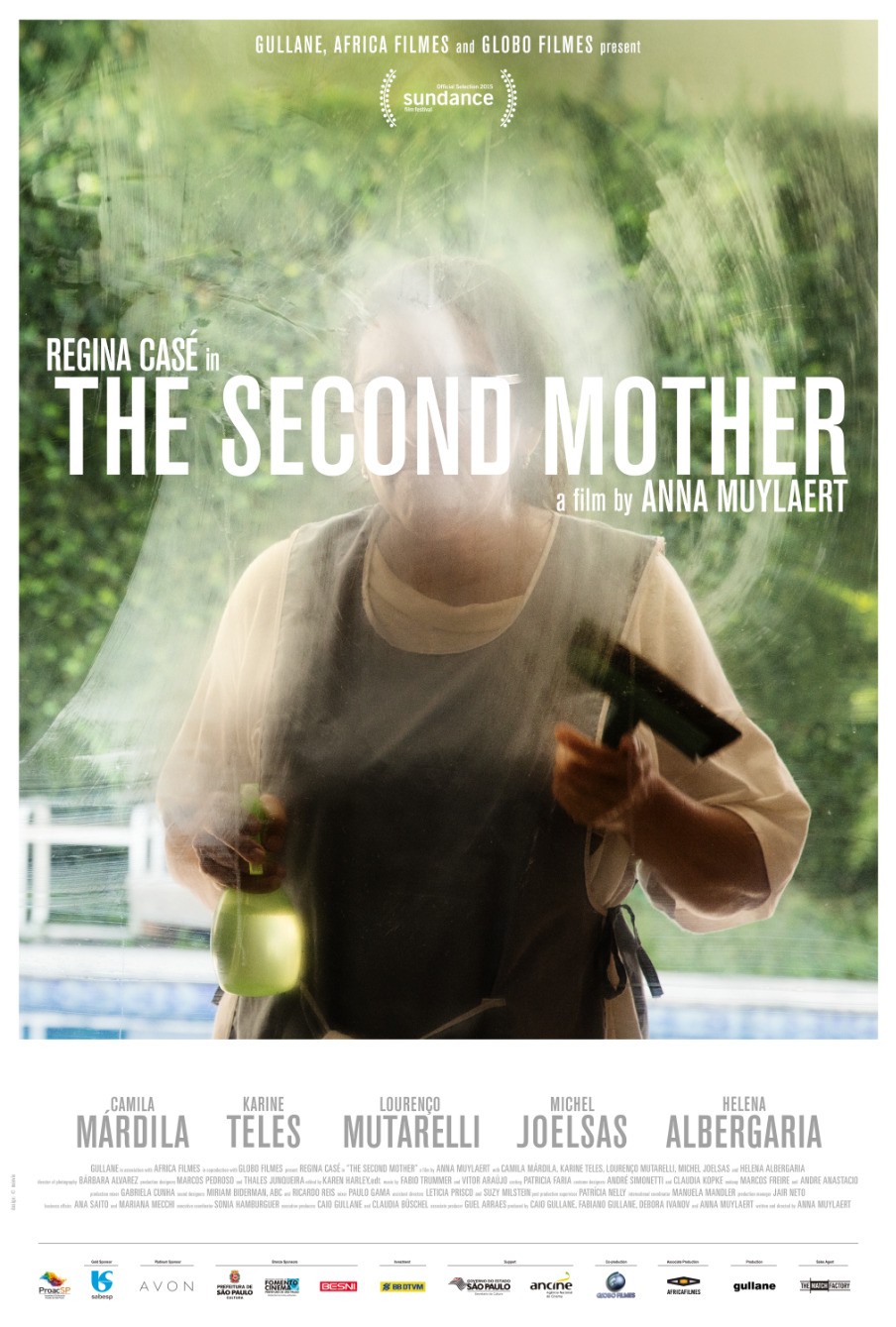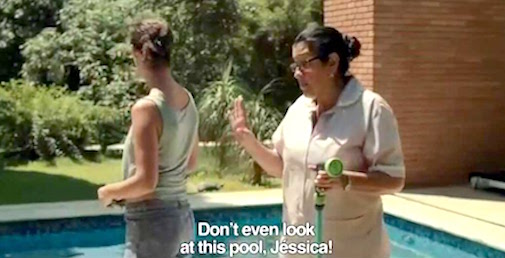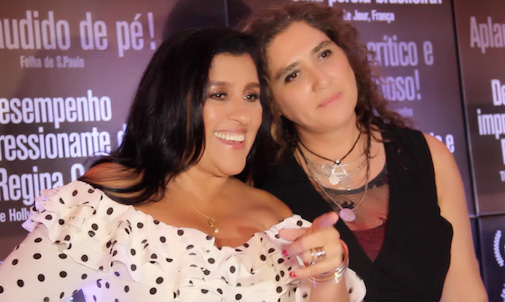 As 2015 winds down, let's turn a spotlight on one of the year's best foreign films, Brazil's Oscar submission The Second Mother. After a successful limited US release in late summer, it's now available to watch on VOD. And watch it you should. The film centers on a housekeeper named Val (a terrific Regina Casé) who is reunited with her estranged teenage daughter after many years apart. The daughter's sudden presence wreaks havoc on the the dynamics of Val's relationship to the family that employs her. It's a rich film with humor, sadness and insight.
As 2015 winds down, let's turn a spotlight on one of the year's best foreign films, Brazil's Oscar submission The Second Mother. After a successful limited US release in late summer, it's now available to watch on VOD. And watch it you should. The film centers on a housekeeper named Val (a terrific Regina Casé) who is reunited with her estranged teenage daughter after many years apart. The daughter's sudden presence wreaks havoc on the the dynamics of Val's relationship to the family that employs her. It's a rich film with humor, sadness and insight.
This interview with writer/director Anna Muylaert and the film's star Regina Casé is edited for clarity because some of it was conducted through a translator. I hope you'll be intrigued enough to check out the film.
NATHANIEL: Anna, since you wrote and directed, let's start with you. What prompted you to do this? Was it personal interests in these topics like parenting, and socioeconomic divisions
ANNA MUYLAERT: It started with me when I had a son. I was interested in talking about the importance of the work of motherhood, and at the same time how it was not valued in our society. And then character of the nanny came about, and then of course, the socioeconomic issues came.
NATHANIEL: Was it hard to find Val? Did you have Regina in mind when you were creating her?
ANNA: I was working on this project for almost 20 years! I didn’t write for an actress, but 13 years ago, when I saw a film that she did called Me, You, and Them, I was in love with her again, and I wanted her to be the character. There was never any other actress but her.
So what took so long?
ANNA: Difficulty raising the money.
I was looking over the credits. This film is heavily female, even below the line, your casting director, your editor…
ANNA: My cinematographer!
Gender disparity behind the camera is a big topic in Hollywood. Is it difficult for women to work in the cinema in Brazil as well?
ANNA: I think the numbers are the same. But in this case, I don’t know, it wasn’t conscious: I didn’t call female technicians because they were women, but because they were the best. The film has raised this discussion because almost all the crew was female, but it wasn't on purpose.
The Second Mother has had a great festival run and theatrical release. Have you now spent more time promoting it than you did making it?
ANNA: We've been promoting it since January. I’m still traveling a lot, but I normally give myself a deadline for that, and then I stop. But if the case is a commercial release, then I have to go.
Have you two ever come down from the high of Sundance and Berlin when you won awards right out of the gate?
ANNA: Yes because there’s so much work -- you don’t have time to be celebrating because you’re flying.
You’ve both been involved with Brazilian movies that have been submitted for Oscars before. Regina with Me, You, Them and Anna wrote The Year My Parents Went on Vacation. Were those similar experiences in terms of touring with the film?
ANNA: No, because I was a writer, not the director, and in Regina’s case...
REGINA CASE: I just went to Cannes. There was not even a choice for Me, You and Them.
I understand, Regina, that you've done some directing for TV though you're best known as an actress. Does that make it easier to be directed now? Do you have a newfound appreciation?
REGINA CASE: Yes, indeed. I wrote and directed a series called City of Man, which was an offshoot of City of God. I loved the directing experience. I realized in doing that how I’m actually an 'auteur actress'. Even though my work is as an actress, my main job is exchanging and creating and sharing ideas. I found out it’s much easier to do that if you’re a writer or director.
I imagine it makes for a great collaboration now. The movie flows so beautifully and feels so lived-in. When the movie came together on the screen, was it what you had envisioned when you wrote it?
ANNA: No. The film grew a lot during the shooting, exactly because of what Regina said. She’s a creative actress. I only chose this type of actor so all the scenes grew very much during the shooting, especially Regina’s. The scene in which Val gives the coffee set to Dona Badra, in the script it was written, Dona Barbra leaves the kitchen and she takes a look at her own gift. She improvised [from there]. The black and white, mismatching stuff, it was an improvisation. So the film grew a lot.
That's such a rich scene. I have to ask about the choice of static camera. We're watching Val go in and out of the rooms rather than moving with her really. Was that style something you set upon very early?
ANNA: Not so early, but before we shot. That was a very important part -- this is a political point of view, right? Seeing the point of view of the kitchen to the living room. Because you can see the passion from the view of the housekeepers. I was influenced by this film in Florence called El Custido by Rodrigo Moreno and a film called Whisky. They were photographed by the same DP of my film, Barbara Alvarez, who is from Uruguay.
Oh, Whisky! That was a special movie.
ANNA: I love that movie, too. Barbara Alvarez, like Regina, is creative so there was a lot of collaboration.

Regina, how did you work with Camila Márdila who plays your daughter to create that tense dynamic? The characters are purposefully not comfortable with each other, and yet you're always touching her so much.
REGINA: One factor that helped was that I was not aware of her -- I’d never met her or worked with her before, so that contributed to creating that dynamic. Creating the character, Val was really making an effort to get close to the person that she hadn’t seen in ten years, and this is why she is always touching and sniffing her and hugging her and trying to establish the communication and contact and understanding.
Did you have rehearsals as actors or did you just film it and go?
ANNA: We did one big rehearsal with her and Camilla and we put a black sheet in the middle of the rehearsing room. They had never met, and I put one actress on one side and the other actress on the other side. They couldn’t see each other, just listen! And then we did a rehearsal of all the ten years of their phone calls, so we rehearsed when she was five and when she was six, and then until the moment they meet at the airport. So it was a long rehearsal, and there was a lot of emotional tension in there. In the beginning, Jessica wanted her mother back, and after a certain point, she starts to get so angry – she’s not polite to the mother anymore. And I remember there was a point when Regina looked at me and screamed, 'Why doesn’t she come back? Why doesn’t she back?' She was so moved.
REGINA: That was just one of the many acting games and exercises that Ana gave us. One of the exercises was that I really did have to take orders like cleaning and hanging out with the actress who plays the other maid, and doing things together, getting tasks to do. I really felt closer with that actress because in the context of the set, she was on my social level, and everybody else was on the boss’s level.
To get the upstairs / downstairs dynamic. Smart. If the film is nominated for Best Foreign Language Film will we see you both at the ceremony? Have you watched before?
ANNA: Of course! Yeah, you know, the Brazilian press is crazy about the Oscars. You can’t imagine how! Like for example, our film was released on August 27th. When it was chosen (to represent Brazil), it was like being released again. It really grew a lot because of this. We are very used to watching the Oscars.
REGINA: We’re a little bit worried because of the expectation after the World Cup and they lost famously to Germany, so it feels like the responsibilities are on our shoulders now. I’m afraid we’re going to get stoned if we don’t come back with something in our hands.
ANNA: You know that Regina is very famous in Brazil, right?
Yes, I did some research and saw the list of films. Regina you've been acting forever. I saw that you won an award when you were only 23, and a major one!
ANNA: Her first play in the theater, she became famous. She was like – I saw her when I was a teenager, and she was like… oh my god, everybody loved her for her first work!
This begs the question, Regina, of how you are able to relate to this character? You’ve been a famous actress for many years, and Val is a poor maid.
REGINA: In my career, I’ve always played women doing manual labor, not high society women; my character in Me You Them cut sugar cane in a field.
When people think of famous actresses, they think of glamour, and that’s very different.
REGINA: Are you asking, “How can you be so ugly?” (Laughs) On that alone, I deserve an award, because I’ve never seen an actress look so ugly!
(Laughter) NO! I'm just imagining that though you're playing a maid, as a famous actress you probably HAVE a maid.
REGINA: Yes, four!
Did you use them for inspiration?
REGINA: For years I’ve been producing and presenting this public TV show that travels all over Brazil, and goes to remote and very poor communities. So I’m very very aware of where the Vals are and how they are. And the slums and working class suburbs, like where the character of Jessica lived, so I’m aware of that. Were it not for the fact that my grandfather made an unexpected social leap, I could have been Val. I’m basically one generation from being that. My four maids are not really an inspiration, but the work is dedicated to them.

